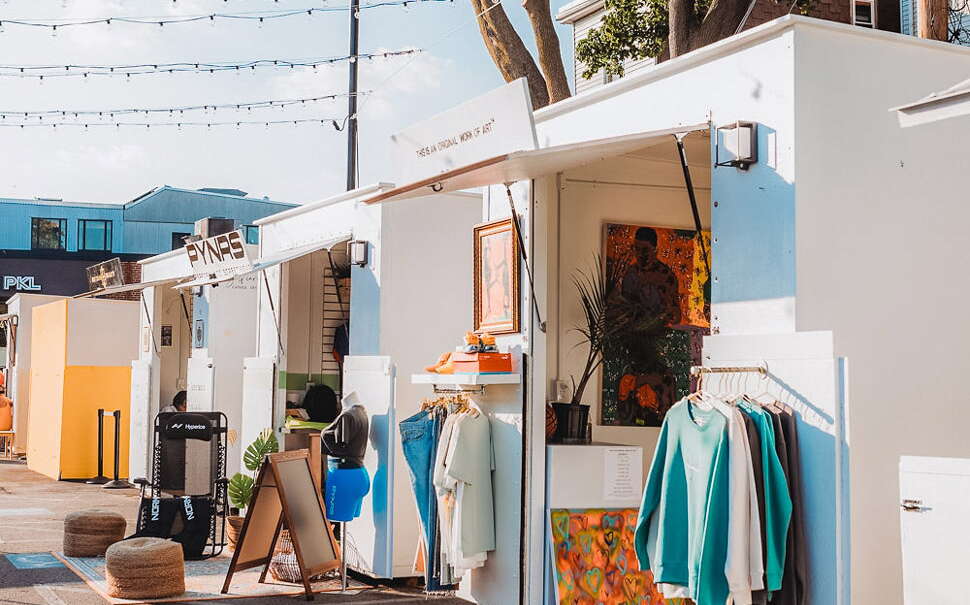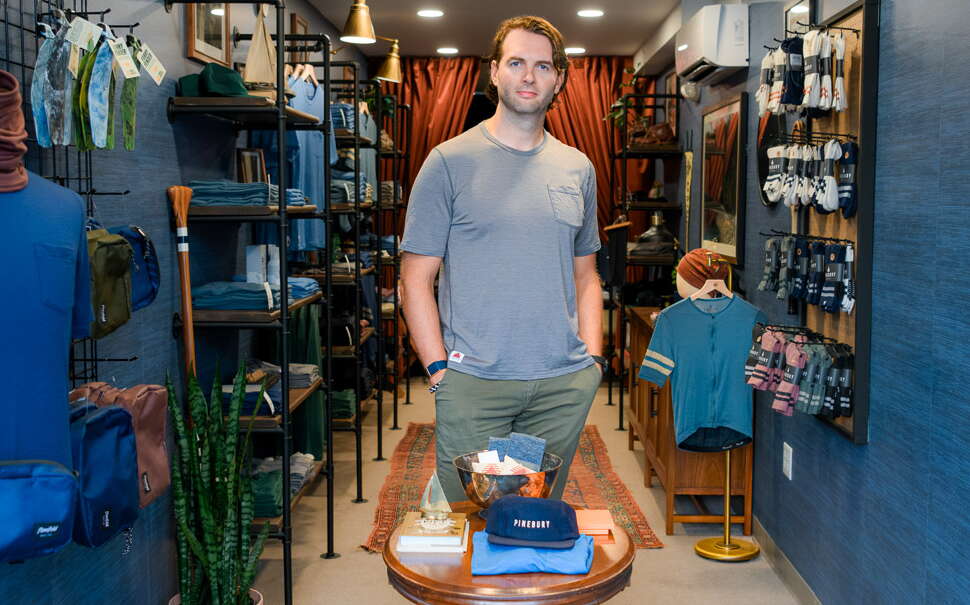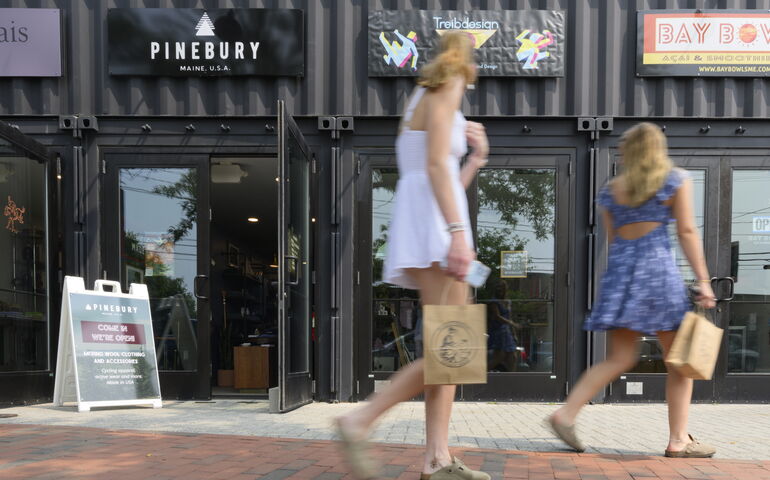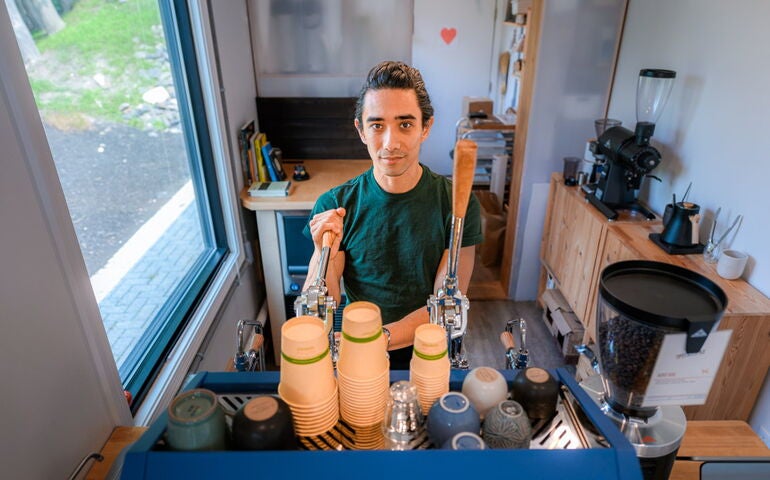
Snap, crackle & pop-up: Temporary retail gains traction in Maine
In a repurposed shipping container barely larger than some closets, David Kessel runs Moonday Coffee. Home to a stand-up wooden counter and Thicket Jewelry’s display case, the 300-square-foot café-plus-store is blissfully quiet as Kessel brews a cappuccino served in a ceramic cup.
“Tiny can be powerful,” he says one weekday morning. “I wouldn’t mind a little more space, but people do gather here, and it feels good.”
A tenant of the Black Box business incubator on Portland’s Washington Avenue since March 2022, the yoga enthusiast and former journalist launched Moonday as a mobile espresso cart on the Eastern Promenade.
“The mobile game was pretty magical, but there’s a lot of uncertainty and a lot of toil,” he says. Joining a handful of other small businesses down the hill at the Black Box “felt like a way to continue to do what we were doing, but in a more rooted, stable place.”
Like a growing number of small businesses in Maine, Kessel has found his sweet spot in pop-up retail.
So has Kira Sangsap, a Scarborough-based designer originally from Thailand. She pays $325 a month for a spot inside the Freeport Market, where she sells colorful hand-painted earrings made from lightweight polymer clay, and patterned polyester silk scarves. Her business is called Choo 11.
She’s one of 80 vendors under one roof who pay month to month for shelf space inside the market, whose rates start at $100 a month plus 23% of revenues. The flexible arrangement works well for the home-based entrepreneur, who’s also a regular at arts and crafts fairs and neighborhood festivals.
“It’s a dream for me to have a store, where I also hope to bring in another product I design, like apparel,” she says. While her online business is wholesale-focused, she says she gets useful feedback from regular interactions with retail customers.
“Sometimes they dress very stylishly, and I get inspired by seeing the color of their shirts and pants,” she says.

$80 billion market
The business model behind pop-up or temporary retail can take many forms, from a shopping-mall kiosk to a stand or table at a market, established retailer or other venue. The supersized version comes with the annual Spirit Halloween big-box takeovers in shopping centers nationwide to peddle costumes and decorations that take their final “boo” after Nov. 1.
While the spooky fad yields once-a-year stores in South Portland, Biddeford, Auburn, Augusta and Bangor, the pop-up concept also strikes a chord with many small retailers and startups, in a state powered by close to 150,000 small businesses.
“One of the appeals of pop-up is it’s a quick way to get out and interact with customers without having the overhead of a permanent storefront,” says Diane Sturgeon, the Maine district director for the U.S. Small Business Administration. “It’s a great way to expand your customer base.”
Across the United States, pop-up retail — including food trucks, farmers markets and garage sales — generates up to $80 billion in annual revenues, with the market projected to reach $95 billion by 2025, according to data aggregated by CapitalOne Shopping in May.
The comparison-shopping website also notes that two-thirds of retailers open a pop-up shop with goals that include raising brand awareness.
Pop-up retailers also tend to be repeat acts, with close to 40% going that route two or three times. In addition, a greater percentage of pop-up shops belong to brick-and-mortar stores (40%) than stem from online businesses (32%).
Though temporary retail has been around since farmers and holiday markets of yore, the phrase “pop-up” didn’t enter the national lexicon until 1997, when media entrepreneur Patrick Courrielche produced the nightclub-meets-shopping center Ritual Expo in Los Angeles. It came to be known as the “ultimate hipster mall.”
The concept quickly caught on with brands and top designers trying to outdo one another above ground and even underwater.
Today, pop-up is more about strategy and focus, notes Allison McCabe, the Boston-based director of retail technology for enVista, an Indiana-based supply-chain and enterprise technology consultancy to clients including Shoe Carnival, Sportsman’s Guide and Spencer’s.
“Regardless of the pop-up, more is not more,” McCabe says. “Pop-up retail leaders should make sure to still have a focused story, with well-planned quantities and sales.”
Small and strategic
When Lewis Goldstein thinks of pop-ups, he mainly thinks of highly trafficked areas of New York City. That’s where his former employer, Organic Valley, staged a month-long cream-themed café and TV commercial backdrop. The year was 2016, the place New York’s SoHo district. Today in Winslow, Goldstein runs a niche snack brand company called Maine Crisp Co.
Lacking resources for big events, the 35-employee maker of Better with Buckwheat crackers regularly stages in-store samples and sales at small vendors like the Blue Hill Co-op in Hancock County.
“When you pop up in a city, it’s a limited target,” Goldstein says. “We focus our limited resources on in-store demos, because we know we’re talking to people that definitely could be interested in buying our products.” The recent Blue Hill haul was 40 boxes sold in three hours.
“That’s a really good amount for a demo of products,” Goldstein says.
This September, Maine Crisp will enlist an outside company for the first time to conduct product samples at Whole Foods stores around the country to ease some of the pressure on employees.
“Right now, the focus is making sure we can fill all the orders that we have,” Goldstein says.
In the midcoast town of Boothbay, Cherie Scott is equally selective in picking pop-up partnerships for her Mumbai to Maine brand of gourmet Indian simmer sauces.
This summer on a farm in Waldoboro, for example, she whipped up a four-course meal for 26 guests for East Forty Farm’s sold-out Cowside Supper Series. And at the Maine State Music Theatre in Brunswick on whose board she serves, Scott sold products at a Christmas-in-July market to promote a production of “Irving Berlin’s White Christmas” musical. The Mumbai native also taught a cooking class this summer at Christopher Kimball’s prestigious Milk Street Cooking School.
“I could spend every weekend doing a pop-up, but they have to have intentional outcomes,” Scott says. “You have to be able to drive your mission and show up to tell your story.”
Midcoast innovator
Demand for pop-up spaces in Maine and well beyond is sparking innovation by suppliers including OpBox, a Woolwich-based startup founded in 2018 by siblings Ben and Emily Davis.
The 20-employee company produces modular, environmentally friendly mobile retail and hospitality units using panels made from recycled plastics.
Example includes L.L.Bean’s summer “Beach Boxes” with free equipment for beachgoers and a three-year-long standalone store for Rugged Seas bags on Portland’s waterfront that sold bags made from lobstermen’s bibs. Outside of Maine, OpBox’s clients include Corksickle, an Orlando, Fla.-based brand of tumblers, coolers and drinkware, for its holiday pop-up store last December outside New York City’s Rockefeller Center near the famous tree and skating rink.
Closer to home in New England, OpBox teamed in 2002 with UpNext, of Newton, Mass., to transform a South Boston parking lot into a multi-brand pop-up “village.” Called the C Street Pop-Ups at Iron Works, it featured six rotating retail units, a wine bar and takeout gourmet grocery store.
“We work with big and small brands, startups to small businesses, all using the same pop-up model,” Ben Davis says. “It’s a great equalizer.”

To date, the company has produced around 100 units, including one that was transported on skis to the top of Black Mountain in Rumford for an L.L.Bean winter ski promotion. The energy-efficient units come in three sizes and include heating and air conditioning.
“For as little as $1,000 a month, you can be in an OpBox retail unit and run your whole business from inside,” Davis says. “There are few retail spaces in Portland where you can do that.”
As OpBox looks to expand its client base to the thousands, the plan is to offer its standard built structure as kits. That’s good news to Allison Yee, founder and CEO of UpNext, which also launched a project in 2021 to create pop-up incubators in municipalities to drive economic development.
“So far it’s just Massachusetts, but we get weekly inquiries from outside Massachusetts and even international,” says Yee. “Maybe Maine could be next.”
Meeting a need
For Black Box tenants on Washington Avenue, the Dayton Group charges $1,400 for a flexible, month-to-month lease that includes utilities and Wi-Fi for a space in the mini-business incubator.
Since the Black Box opened in 2018, it has hosted around 15 businesses in addition to short-term pop-up with varying lengths of stays.
Former tenants include the Cheese Shop of Portland, which is now based in a nearby brick-and-mortars store steps from where it started, and handbag designer Alice Yardley, who now leases space on Exchange Street in the city’s Old Port.
“We’ve had businesses pop up for as short as one month and others who have stayed for multiple years,” says developer Jake Edwards, managing partner of the Dayton Group.
The Black Box, he says, “was born out of a need for more accessible, move-in ready space to provide startup businesses with a low barrier of entry to a storefront,” he says. Taking a concept from the previous owner, Jed Harris, Edwards says that he and his team have “branded it, and market it as a retail incubator for the neighborhood.”
Amid high demand, the owner has sought to curate the right mix of tenants.
“We are mindful to avoid having businesses who compete with one another directly but have been lucky that the model resonates with entrepreneurs and has attracted a diverse group of small businesses,” he says.
Current tenants include Pinebury, a retailer of high-performance, American-made merino wool apparel owned by Kyle Rancourt. The carpeted space aims to evoke a 1950s/‘60s-era retro look with paneled walls and vintage bicycle helmets and other equipment on display.
Divided into sections, including a curtained changing room at the back, the venue feels a lot bigger than its actual size. Though the store can fill up quickly at times, Rancourt says that customers are good about waiting outdoors if needed.
“With that being said, it’s still a really low risk and affordable space to have a retail space in Portland,” the Lewiston native says. He hopes to stay in the neighborhood indefinitely.

Two doors down at Moonday Coffee, David Kessel is also in no hurry to leave the Black Box.
“Things shift in their own time,” he says, “so we’re casually keeping our eyes open.”
















0 Comments